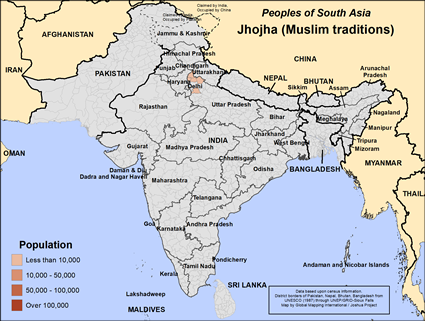Jhojha (Muslim traditions) in India

Photo Source:
Anonymous
|

Map Source:
People Group data: Omid. Map geography: UNESCO / GMI. Map Design: Joshua Project
|
| People Name: | Jhojha (Muslim traditions) |
| Country: | India |
| 10/40 Window: | Yes |
| Population: | 9,500 |
| World Population: | 9,500 |
| Primary Language: | Urdu |
| Primary Religion: | Islam |
| Christian Adherents: | 0.00 % |
| Evangelicals: | 0.00 % |
| Scripture: | Complete Bible |
| Ministry Resources: | Yes |
| Jesus Film: | Yes |
| Audio Recordings: | Yes |
| People Cluster: | South Asia Muslim - other |
| Affinity Bloc: | South Asian Peoples |
| Progress Level: |
|
Introduction / History
The Jhojha are a Muslim people from Central Asia that came to India before and during the Mughal period. They came as soldiers and settled in villages in north India. The word Jhojha in Prakrit means warrior, changed from Arabic word Jahja. The Jhojha are believed to be of Turkish origin.
The Jhojha are essential small and medium sized farmers. Their villages tend to be of one caste. The Jhojha cultivate wheat, maize, sorghum and sugar cane.
The Jhojha have tried to obtain status as an Other Backward Scheduled Caste but so far have been unsuccessful. Indian Scheduled Castes receive special preference for government jobs and university admissions.
The primary language of the Jhojha is Urdu. They also speak other regional languages.
Jhojhas are Quresh. They are Ssiddiqi, Faruqi and Aqeelies. They came from Bukhara with Abdullaha Qratgi, a general of Mehmud Gaznvi.
Where Are they Located?
Most Jhojha live in the Indian state of Uttar Pradesh. Smaller groups live in Haryana and Punjab. Some Jhojha also reside in the nation of Pakistan.
What Are Their Lives Like?
The Jhojha are an endogamous community, that is, they prefer marrying close kin. The families arrange marriages with the consent of the young people. Sons inherit their father's property. The newly married couple lives near or with the groom's parents.
The Jhojha have a fairly active caste council, which deals with community welfare as well as an instrument of social control. They have seen a growth in madrasas or Muslim religious schools in their villages. The Jhojha dead are buried.
The Jhojha are not vegetarians but as Muslims they do not eat pork. Their main foods are wheat, maize, sorghum and seasonal vegetables and fruit.
What Are Their Beliefs?
The Jhojha are Sunni Muslim, the largest branch of Islam. They attempt to obey the teachings of the Qur 'an and the prophet Muhammad. They believe that by following the Five Pillars of Islam that they will gain entrance to heaven when they die. As Muslims they pray five times a day facing Mecca, fast during the month of Ramadan, attend mosques on Friday and give alms to the poor. If they have sufficient resources, they will make a pilgrimage to Mecca once in their lifetime.
The two main holidays of the Jhojha are Eid al Fitr, the breaking of the monthly fast and Eid al Adha, the celebration remembering the willingness of Abraham to sacrifice his son to Allah.
What Are Their Needs?
The Jhojha need to hear the life-changing message of Jesus Christ in a way they can understand. They need to see the love and mercy of Christ lived out before them in practical ways. Many Jhojha live in villages without modern conveniences so a Christian development team would benefit them.
Prayer Points
Pray that a strong movement to Jesus will bring whole Jhojha families and communities into a rich experience of God's blessings.
Pray the Lord creates a hunger for Jesus or Isa and the Bible among the Jhojha.
Ask God to deliver families and communities within the Jhojha people from fears that hinder them from embracing God's blessings in Christ.